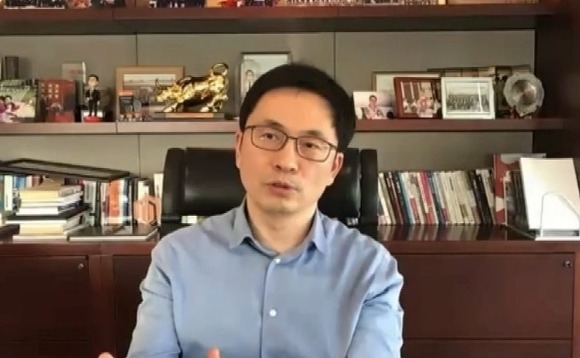
Hillhouse founder bullish on China life sciences

Lei Zhang, founder and CEO of Hillhouse Capital, emphasized the opportunities at the nexus of life sciences and artificial intelligence-enabled supercomputing, while describing his firm as “probably the largest investor in healthcare in China.”
Speaking at the Asian Financial Forum, which is organized by the Hong Kong government, Zhang (pictured) noted that the coronavirus pandemic has laid bare the needs of healthcare systems, from vaccines to frontline medical care to post-treatment rehabilitation services. "A lot of things need to be revamped," he said.
Hillhouse has made a string of healthcare investments, notably committing $830 million to JD Health as part of a $900 million round in August 2020. Four months later, the online-to-offline healthcare spinout from JD.com went public in Hong Kong. It currently has a market capitalization of around $59 billion, valuing Hillhouse's stake at $2.6 billion.
The private equity firm has also participated in funding rounds for numerous biotech companies, such as Transcenta, InvestisBio, Antengene, Genor Biopharma, and Everest Medicines, according to AVCJ Research. Antengene and Everest both went public in Hong Kong last year, while Hillhouse came in as a cornerstone investor for several other biotech IPOs in the territory.
Zhang said that Hillhouse had built an internal operations team dedicated to the sector. "We noticed there is a big gap in having the clinical research organizations and clinical research-based hospitals to help innovative companies. We are building that clinical research infrastructure to help our portfolio companies be better, to trial their products or apply their technology much faster," he said.
In addition, Zhang highlighted opportunities in cloud-based business services technology driven by gravitation towards online communication and in helping companies in traditional industries upgrade their operations by leveraging technology.
On broader approaches to investment, he emphasized the importance of unconventional thinking, noting that the class business school curriculum encourages programmed thought processes. Zhang prefers to give his staff a broad framework for considering investments – based on people, business, environment, and organization – and not have them adhere to a rigid scoring system.
"You almost need deprogramming to stick to first principles, to say wait a minute, what are we really doing, what is the essence of the model, who are the people, what is your motivation, and how are people continuing to carry out organization success?" he said.
Hillhouse raised $10.6 billion for its fourth fund in 2018, which remains the largest final close by an Asia-based vehicle, pending KKR's completion of its latest offering. For the latest vintage, Hillhouse is raising separate buyout, growth, and venture vehicles. It is seeking $9.5 billion and $2.5 billion, respectively, for the buyout and growth funds.
Latest News
Asian GPs slow implementation of ESG policies - survey
Asia-based private equity firms are assigning more dedicated resources to environment, social, and governance (ESG) programmes, but policy changes have slowed in the past 12 months, in part due to concerns raised internally and by LPs, according to a...
Singapore fintech start-up LXA gets $10m seed round
New Enterprise Associates (NEA) has led a USD 10m seed round for Singapore’s LXA, a financial technology start-up launched by a former Asia senior executive at The Blackstone Group.
India's InCred announces $60m round, claims unicorn status
Indian non-bank lender InCred Financial Services said it has received INR 5bn (USD 60m) at a valuation of at least USD 1bn from unnamed investors including “a global private equity fund.”
Insight leads $50m round for Australia's Roller
Insight Partners has led a USD 50m round for Australia’s Roller, a venue management software provider specializing in family fun parks.








